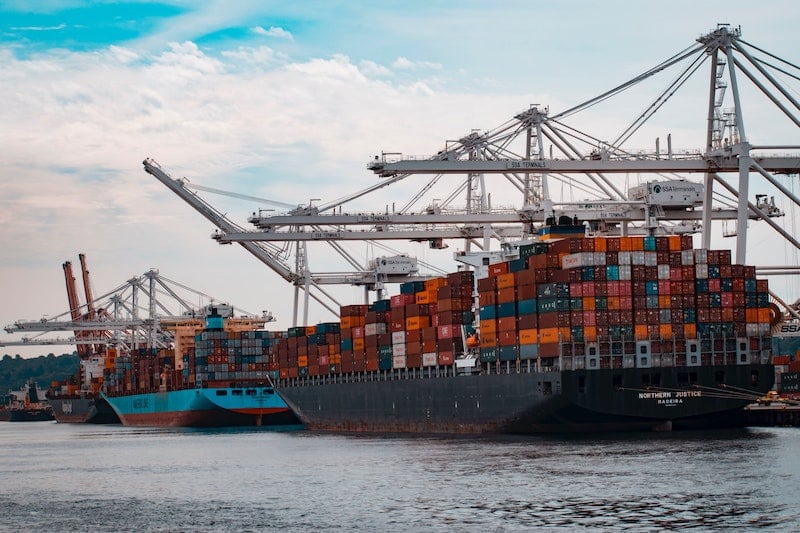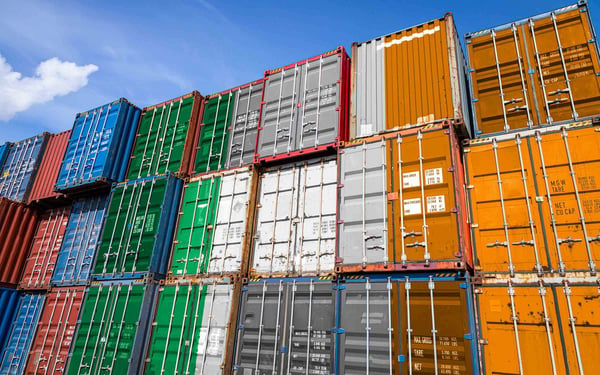A perfect storm of circumstance - the global pandemic, Brexit, and buoyant consumer demand - has resulted in a shipping container shortage which is wreaking havoc on global supply chains with no respite likely in 2021.
Earlier this year ships bound for ports around the globe were leaving China light on cargo due to the scarcity of boxes to pack goods in while on the other side of the world in Europe and the US, tens of thousands of 40ft containers lie empty, increasingly clogging up ports.
Driven by Covid-19 demands many containers are making one-way journeys from China and India creating a “container imbalance” which saw, for example, 11,000 containers of government-procured PPE creating a logjam at the UKs biggest port, Felixstowe in November.
Once emptied there are not enough goods to be exported back to Asia to fill this capacity creating a substantial problem whose effect is being felt most keenly back in the east - India’s export volume leapt 24 percent in Q3 but was significantly constrained from additional growth by the dearth of containers which also contributed to imports falling by 28 percent.
Increased costs
Consumer demand in the west has also rebounded from early-pandemic lows, much more quickly than the supply chain has been able to adjust and as a result the price of shipping a container has skyrocketed.
Hellenic Shipping News reports prices having more than tripled to US$5,000 and more in December 2020 compared to US$1,300 in March.
Additionally, the cost of ocean freighting an additional empty container jumped from US$500 to US$1,300 over a three-day period in November alone while the average pick-up fee between China and Europe was three times higher than that of other routes.
As European demand soars on the back of adjustments to the pandemic, carriers are now maxing out on container capacity - Maersk was operating at 96% capacity in Q3 - which has compounded storage issues at ports leading to increased delays and cargo rollovers with congestion charges added to the already burdensome additional charges carriers are facing.
Knock on effects
The backlog at Felixstowe, which handles 40% of all containers in Britain, has had a significant knock on effect over and above the thousands of empty containers that will eventually have to be shipped back to their original destinations.
It means other cargo is having to find alternate offloading solutions creating further logistical challenges for UK importers already stretched due to pre-Brexit stockpiling.
Indeed, such is the severity of the issue, some container ships are skipping UK port calls altogether or are reducing their time at berth.
Elsewhere, the warehouse take-up rate for London and the south-east of England in the first half of 2020 was 74% above the long-term first-half average for the region according to property adviser Savills, creating further storage difficulties for the supply chain.
While retailers in the UK have been building up stock ahead of leaving the European Union, they’ve also seen a dramatic structural shift towards online shopping during the pandemic creating more challenges. John Roberts, chief executive of electrical goods retailer AO.com, told The Guardian:
“Over a third of the product we receive is arriving at the wrong time. That might sound like a very simple thing but when you’re planning labour and bays on warehouses, it adds a phenomenal amount of complexity and quite a bit of cost as well.’
And it’s not just a UK issue, Australian news site 9Now.com.au in Australia reports that, “... bikes and books to technology and toys - they're all experiencing a supply shortage.”
Challenges
If you’re in the container liner business, of course, none of this is bad news. The industry reported its best profits in a decade in Q3 2020 with the largest operator by fleet capacity, Maersk, reporting earnings before interest, taxes, depreciation, and amortization (EBITDA) of $2.3 billion. This was 39 percent up compared with the same period in 2019.
But if you’re running a business in one of the other key areas of the global supply chain - production planning, purchasing, materials management, customer service, or sales forecasting - it’s an expensive headache.
And on the horizon is further disruption as 100s of millions of Covid-19 vaccinations are shipped through 2021. Although most of this will be air freighted, forwarders are already complaining about their freight being bumped off flights to make room for the badly needed inoculations.
This trend is expected to grow as the year progresses and already stretched shipping and road routes will be put under further pressure resulting in overall transport prices remaining high for the foreseeable future.
As a result both importers and exporters are likely to look to new distribution methods while also sourcing alternate purchasing and storage options.
But where there are undoubtedly challenges ahead, there are also opportunities.
Opportunities
Supply Chain Brain suggests the digitalisation of often manual processes is one way to offset the headwinds of supply chain disruption. For example, a recent MIT Pulse survey found that 38% of respondents hadn’t mapped their supply chains while 65% hadn’t mapped their supplier’s suppliers due to lack of tools.
Sourcing tools and companies to help manage, support and potentially diversify strategic elements of the supply chain through 2021 could reap benefits according to research firm, Gartner and this may mean the need for enhanced foreign exchange operations.
CurrencyFair allows businesses to hold over 20 currencies and exchange to the currencies they might need when sourcing new supply chain partners across Asia including Hong Kong and Singapore, where we have offices, plus India, Indonesia, Philippines and Thailand.
Chief Executive Officer, Paul Byrne, recently told HKTDC Research:
“We have been in Hong Kong for just over a year, after acquiring the technology company Convoy Payments in December 2018. We began signing up customers in the city in the middle of 2019 and in the space of a year, we have now worked with and serviced more than 250 corporate merchants”.
CurrencyFair’s FX Solutions Team work with business customers that are exposed to currency fluctuations at different stages of the supply chain. Sourcing and paying new suppliers in Asia with CurrencyFair can be cheaper and faster than ever and is just one way in which businesses can seek to adjust to the current supply chain challenges.
Sign up for a CurrencyFair Business Account to get our best rates today.
Conclusion
As they continue to be beset by supply chain disruption in the short-term, there is a longer-term opportunity for businesses to diversify and potentially save significant costs through innovation in technology, purchasing, materials management and other areas of the supply network that have come under pressure during the pandemic but which could benefit from a flexible, solutions-focused approach in 2021.
The supply chain itself has proved extremely resilient in this most challenging of years and businesses must continue to refine how they interact with it in the ‘new normal’ and beyond.
Sources:
https://www.hellenicshippingnews.com/what-is-container-imbalance-in-shipping-industry/
https://www.hellenicshippingnews.com/shipping-container-freight-rates-soar-amid-export-boom/
https://www.hellenicshippingnews.com/despite-shortage-containers-rotting-in-depots/
https://theloadstar.com/forwarders-see-their-cargo-bumped-as-vaccine-shipments-take-off/
https://www.joc.com/maritime-news/shippers-brace-wave-carrier-charges-service-suffers_20201202.html -
https://www.bbc.com/news/business-54989299
https://theloadstar.com/australian-shipping-operations-theyve-never-been-in-a-worse-state/
https://epsnews.com/2020/11/18/container-shortage-begins-to-impact-shipping/
https://www.bbc.com/news/business-54989299
https://www.gartner.com/smarterwithgartner/diversifying-global-supply-chains-for-resilience/








.png?width=600&name=Red%20Navy%20Blue%20Real%20Estate%20Marketing%20Instagram%20Post%20(1700%20x%20500%20px).png)



